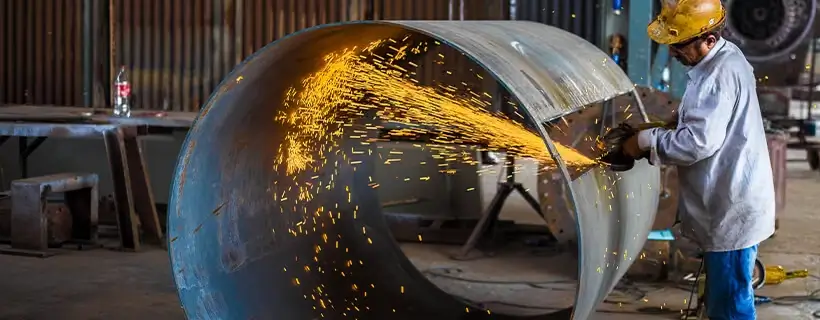Fabricator Jobs in Australia

What does a Fabricator do?
What skills does a Fabricator need to have?
Preparation
Reading, analysing, and interpreting blueprints is the first part of the preparation phase. Correctly measuring, marking, or programming where required, is extremely important. Doing so promotes high productivity levels and minimal interruptions. Good communication with key personnel in the production line is also crucial. It allows a Fabricator to correctly determine the equipment and raw materials that will be required to complete the process. Moreover, it maximises the possibility of identifying any obstacles that may arise during the production process. Basic mathematics and problem-solving experience are beneficial when preparing materials for the fabrication.
This is the phase where the Fabricator punches, cuts, rolls, and welds the raw materials to form a structure. A Fabricator must be proficient in the set up and use of metal work machinery such as drill presses, cutting torches, shears, and welding equipment. Welding is a daily task in most roles. Those who are competent in multiple welding techniques such as stick, MIG and TIG will be in an advantageous position. Quality control is another important component of a Fabricator’s role, an aspect which requires attention to detail. There is an expectation that a Fabricator can identify and repair defects, remake components, or make alterations to existing parts.
Fabricator job responsibilities
- Read and analyse blueprints to determine job requirements
- Measure, mark, cut, punch, roll and weld metal objects, ensuring that all parts are aligned and assembled as specified
- Identify, examine, test, and repair faulty parts
- Grind and finish completed parts and objects
- Adhere to WHS policies and procedures
- Communicate with other team members and trades professionals to ensure high level of productivity is maintained
- Safe and competent use of a large range of hand and power tools including grinder, drop saw, circular saw, brake press, guillotine etc.
- Proficiency in computer aided manufacturing. Includes devices and machinery such as CNC machine and laser cutter
- Maintain and stick to production timeline
- Lift/carry heavy pieces of metal or structures
Skills and experience employers are looking for
- Logical and analytical thinker
- Basic mathematics and excellent problem solving skills
- Strong communication skills
- Measure, mark, cut, punch, roll and weld metal objects, ensuring that all parts are aligned and assembled correctly
- Repair defects, remake components or make alterations to existing parts
- Proficiency in using metal work machinery such as drill presses, cutting torches, shears and welding equipment
Core Skills
Employers are looking for process-oriented Fabricators who can add logic and critical thinking to the production process. The effective interpretation of blueprints and specifications are considered as essential. Methodical preparation along with accurate measuring and marking are must-have skills that will carry significant weight with employers.
Those with basic math knowledge and excellent problem-solving skills will be looked at favourably. Employers have noted that these are closely related to identifying defects and determining the most efficient method to correctly assemble and fabricate parts. This results in high output, excellent productivity levels and minimal delays.
Sound communication skills are an underrated asset according to employers. They have found that effective communication between Fabricators and key personnel have a positive impact on preparation, fabrication, quality control, safety, and overall productivity. Those with a history of strong communication skills are urged to make not of such in their resume.
Technical Skills
Similarly, employers expect a Fabricator to be have the skills required to repair defects, remake components, or make alterations to existing parts. Achieving such requires competent use of tools such as drill presses, cutting torches, shears, and welding equipment. Those who have experience using multiple welding techniques are likely to be presented with additional opportunities.
What type of employers hire a Fabricator?
Construction – Steel has become the most common material used in modern day construction and infrastructure. This has created many steel fabrication jobs both on-site and in workshops.
Government – Opportunities exist within local councils who have dedicated Fabricator teams. They work in tandem with other trades professionals to manage and maintain public utilities.
Education – Suitable for experienced Fabricators who pass on their knowledge to those seeking a career as a Fabricator. Requires additional training and certification.
Logisitics – This applies to air, land and see. Those with specific experience will find that there are Fabricator jobs relating to motor vehicles, boats, and aircraft.
Manufacturing – A large portion of Fabricator jobs are available within the manufacturing industry. Fabricators are in high demand from companies that create architectural and structural metal products.
Resources & Mining – There are jobs available working in mines and factories or assembling scaffolding and other structures which require the expertise of a Fabricator with welding skills.
Fabricator qualifications
- Certificate III in Engineering (Fabrication Trade)
- School Certificate
- White Card for employment in the construction industry
How to become a Fabricator in Australia
- Certificate III in Engineering (Fabrication Trade)
- Hands-on experience is crucial. An apprenticeship provides a solid foundation, but it is recommended that Fabricators enhance their skills by becoming proficient in multiple welding techniques.
- Focus on your core skills. Employers are placing significant value on sound communication and excellent problem-solving skills.
- Obtaining licences to drive/operate machinery and equipment, and attain your White Card to work in the construction industry.
- Highlight the success stories of your previous work by including references from former employers or any certification from professional development.
- Experienced Fabricators with comprehensive knowledge can transition beyond the workplace and into education by obtaining further accreditation.
Search for jobs
Find permanent, temporary or contract jobs with Hays.
Government and public sector roles available through Hays.
We can provide you with fast, easy access to job opportunities.

Career Advice
View templates and tips to help you start your job search journey.
Access expert advice for all stages of the job hunting process.
Master the art of job interviews with helpful articles and tips.

Tools & Resources
Simplify your job search by setting up a Hays job alert.
Find out if you're earning the salary you deserve.
Sign up to get expert career advice delivered to your inbox.

